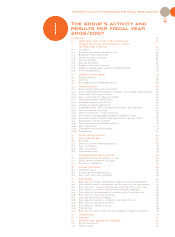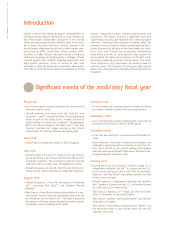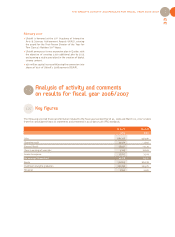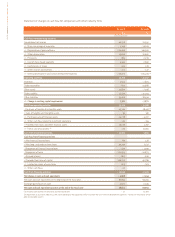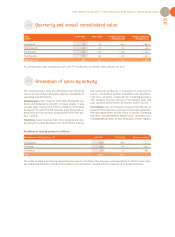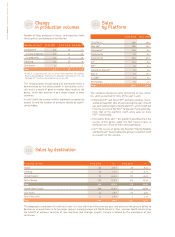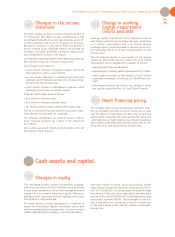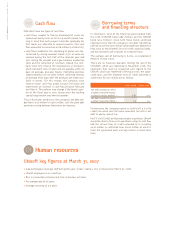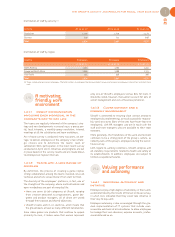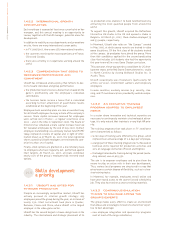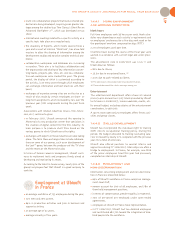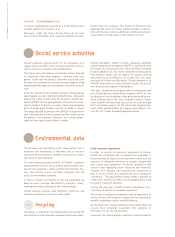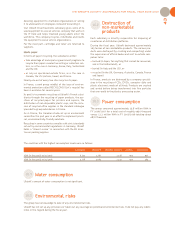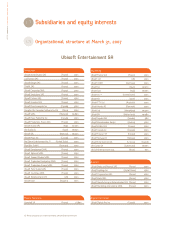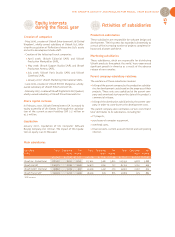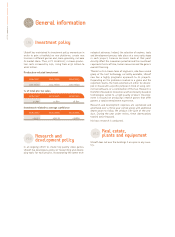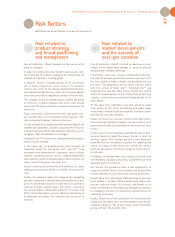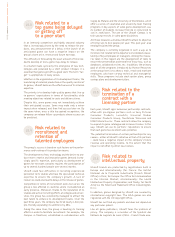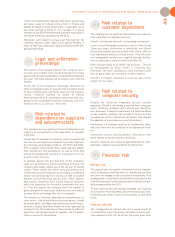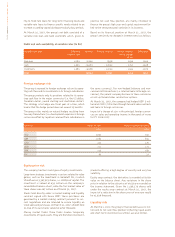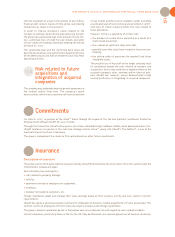Ubisoft 2006 Annual Report Download - page 53
Download and view the complete annual report
Please find page 53 of the 2006 Ubisoft annual report below. You can navigate through the pages in the report by either clicking on the pages listed below, or by using the keyword search tool below to find specific information within the annual report.
THE GROUP'S ACTIVITY AND RESULTS FOR FISCAL YEAR 2006-2007
41
1
multi-site collaboration projects that involve shared pro-
duction are being developed, requiring even greater dia-
logue among the studios (e.g. Tom Clancy’s Ghost Recon
Advanced Warfighter 2™, which was developed at two
sites);
international meetings related to a specific activity or a
specific topic take place on a regular basis;
the Academy of Experts, which meets several times a
year and is a sort of internal “think tank”, has a two-fold
mission: to allow the sharing of information among the
development studios and to solve complex technical pro-
blems;
collaborative workspaces and databases are increasing
in number. Their aim is to facilitate collaboration and
the organization and sharing of key information concer-
ning teams, projects, jobs, sites, etc. 300 new collabora-
tive web workspaces were created this year. The group
portal, the display of which is customized according to
the activity, is an entry point through which employees
can exchange information and best practices with their
peers;
exchanges of expertise among sites are on the rise as a
result of trips made by certain employees on short- or
long-term assignments, which increased by 74% over the
previous year (181 assignments during the past fiscal
year);
Associations with related industries (music, film, televi-
sion, etc.) continue to grow:
in February 2007, Ubisoft announced the opening in
Montreal of a new production center that specializes in
the creation of digital content for the film industry. Its
main purpose is to produce short films based on the
various games to which Ubisoft owns the rights;
exchanges with experts in these industries are also taking
place. The form these exchanges take include collabora-
tions on some of our games, such as on development of
the Lost™ game, between the producers of the TV show
and the teams at the Montreal studio;
In terms of human resource management, Ubisoft conti-
nues to implement tools and programs firmly aimed at
developing and motivating its teams.
According to the latest in-house survey, nearly 90% of the
group’s employees feel that Ubisoft is a good company to
work for.
Employment at Ubisoft
in France
an average workforce of 755 employees during the year,
71% men and 29% women,
64% in production activities and 36% in business and
support activities,
an average age of 32 years,
average seniority of five years.
1.4.4.1 Work environment
and working conditions
Work hours
Full-time employees work 35 hours per week. Work sche-
dules vary depending on each activity’s requirements and
on employees’ preference for a five-day work week or for
the granting of overtime compensation days (RTT).
2.2% of employees work part time.
Overtime hours during the course of the fiscal year were
worked in accordance with current legal and union provi-
sions.
The absenteeism rate in 2006/2007 was 1.5% (1) and
breaks down as follows:
80% due to illness,
15.5% due to exceptional leave, (2)
4.5% due to work-related accidents.
Entertainment
The entertainment department offers shows at reduced
prices (a 40% discount on 2,025 tickets provided by Ubisoft
to its teams in 2006/2007), leisure weekends, events, etc.
Its annual budget, excluding salaries of the entertainment
coordinators, is €400,000.
A sports room open only to employees offers fitness acti-
vities and group classes.
1.4.4.2 Skills development
Ubisoft has incorporated the individual right to training
(DIF) into its occupational training policy. During the
period, the budget allocated to training (excluding sala-
ries) increased by nearly 27% compared with the previous
year, for a total of €792,045.
Ubisoft also offered positions to several interns and
apprentices during FY 2006/2007. Internships are often a
bridge to employment. In France, for example, one-third
of the junior employees hired this year had previously
completed an internship at Ubisoft.
1.4.4.3 Employment and
non-discrimination
Information concerning employment and non-discrimina-
tion in France is presented below:
69% of Ubisoft’s workforce in France comprises manage-
ment-level staff,
women account for 29% of all employees, and 78% of
them hold management positions,
in terms of compensation, gender equality is respected,
75% of personnel are employed under open-ended
agreements,
employees at Ubisoft in France have representation,
in FY 2006/2007, Ubisoft had two disabled employees
and contributed €82,700 toward the integration of disa-
bled people into the workforce.
1.4.4
(1) The absenteeism rate excludes maternity and paternity leave.
(2) These include time off for a birth, marriage, moving, etc.


